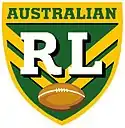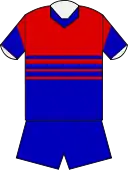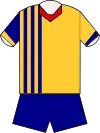1995 ARL season
The 1995 ARL premiership was the 88th season of professional rugby league football in Australia, and the first to be run by the Australian Rugby League following the hand-over of the Premiership's administration by the New South Wales Rugby League. For the first time since the 1988 NSWRL season, the Premiership expanded again, and for the first time ever outside the borders of New South Wales and Queensland, with the addition of four new clubs[1] from North Queensland, Western Australia, South Queensland and Auckland. This saw a total of twenty teams, the largest number in the League's history, compete during the regular season for the J J Giltinan Shield, which was followed by a series of play-off finals between the top eight teams that culminated in a grand final for the Winfield Cup between the newly re-branded Sydney Bulldogs and the Manly-Warringah Sea Eagles.
| 1995 Australian Rugby League | |
|---|---|
 | |
| Teams | 20 |
| Premiers | |
| Minor premiers | |
| Matches played | 229 |
| Points scored | 5,370 |
| Attendance | 3,352,927 |
| Top points scorer(s) | |
| Player of the year | |
| Top try-scorer(s) | |
The 1995 season also saw the first major consequences of the Super League war, with the ARL's refusal to select players from the eight clubs (which included every club that had won the premiership since 1988) for State of Origin or Test matches, including the 1995 Rugby League World Cup, who had aligned with News Ltd's proposed Super League.
Season summary
1995 would prove to be a year of massive change for the League. In addition to the introduction of four new teams, it was the last year of the premiership's association with Rothmans and the Winfield brand and consequently the final year that clubs competed for the Winfield Cup.
The storm clouds that had been gathering for some time in the form of rumours and speculation about Super League were to break on 1 April 1995 with a verification that would rain on the game with more force than anyone could have expected. The subsequent Super League war would rock the sport in Australia and set it back almost a decade in terms of its loss of public support and damage to its grass roots values.
The 1995 season was played in front of a background of legal actions, breaking friendships and with clubs, players and managers all jockeying for position and self-interest. Players who had signed with the new Super League venture were forbidden by the ARL from participating in the 1995 State of Origin. Queensland and New South Wales selectors were limited to selecting players only from ARL-aligned clubs.
The usual twenty-two regular season rounds were played from March till August. However the large number of teams meant a resulting top eight would battle it out in the finals rather than the usual five. These were Manly, Canberra, Brisbane, Cronulla, Newcastle, Sydney Bulldogs, St. George and North Sydney (who made it in due to Auckland being penalised for an interchange infringement). Cronulla-Sutherland's halfback Paul Green was awarded the 1995 Rothmans Medal. The Dally M Award was given to Canberra's five-eighth, Laurie Daley who was also named Rugby League Week's player of the year. Manly-Warringah's Steve Menzies became the first forward for 50 years to top the season's try-scoring list, while his teammate Matthew Ridge set a club point scoring record of 257 points (11 tries, 106 goals and 1 field goal) to be the league's leading point scorer for the year.
By the end of the regular season, the ARL's inaugural 20-team competition had set a new record for aggregate match attendances of 3,061,338.[2]
Advertising
1995 marked the final year of the New South Wales Rugby League's sponsorship arrangement with Rothmans and Winfield due to the Federal Government's blanket ban on cigarette advertising in Australia effective from 1 January 1996. It was consequently the final year of a seven-year association with Tina Turner and the end of an era in Australian sports marketing.
With a lock-up-your-daughters, kick-off your suspenders, red-blooded Tina Turner marketing blitz, the ARL had stuck it right up the other footy codes.
As in 1994 the New South Wales Rugby League and its advertising agency Hertz Walpole returned to the original 1989 recording of The Best by Turner to underscore the season launch advertisement. Footage from the studio bluescreen shoot taken during Turner's 1993 Sydney visit was used in the final advertisements. The enduring images are of Turner performing the song on an elevated stage in front of the fluttering banners of the 20 clubs that would participate in 1995's expanded competition.
Teams
When the Australian Rugby League began taking bids for additional teams to begin playing in 1995, it was expected that only two teams would enter. The Auckland Warriors were the first club to be accepted, with the final place being fought for by South Queensland, North Queensland and Perth. The Australian Rugby League later announced that all three clubs had been accepted, taking the number of teams from 16 in 1994 to 20 in 1995, the highest it had ever been and would ever be.
With the addition of the Auckland Warriors, North Queensland Cowboys, South Queensland Crushers and Western Reds the 1995 season involved an unprecedented twenty clubs,[4] including five Sydney-based foundation teams, another six from Sydney, one from Newcastle, one from Wollongong two from Brisbane, one from Gold Coast, one from Townsville, one from Auckland, one from Canberra and one from Perth, who all contested the premiership, making it the largest competition in terms of participation in Australia's history.
We haven't brought these teams into the Winfield Cup just to see them dropped after one season
With the storm that would be the Super League war already brewing in the background, three clubs based in Sydney suburbs, in an effort to position themselves favourably as battle lines were being drawn up, re-branded themselves for the 1995 season with less geographically distinct names: the Balmain Tigers became the 'Sydney Tigers', the Canterbury-Bankstown Bulldogs became the 'Sydney Bulldogs', and the Eastern Suburbs Roosters became the 'Sydney City Roosters'.
Ladder
| Team | Pld | W | D | L | PF | PA | PD | Pts | |
|---|---|---|---|---|---|---|---|---|---|
| 1 | 22 | 20 | 0 | 2 | 687 | 248 | +439 | 40 | |
| 2 | 22 | 20 | 0 | 2 | 634 | 255 | +379 | 40 | |
| 3 | 22 | 17 | 0 | 5 | 600 | 364 | +236 | 34 | |
| 4 | 22 | 16 | 0 | 6 | 516 | 287 | +229 | 32 | |
| 5 | 22 | 15 | 0 | 7 | 549 | 396 | +153 | 30 | |
| 6 | 22 | 14 | 0 | 8 | 468 | 352 | +116 | 28 | |
| 7 | 22 | 13 | 0 | 9 | 583 | 382 | +201 | 26 | |
| 8 | 22 | 11 | 2 | 9 | 542 | 331 | +211 | 24 | |
| 9 | 22 | 12 | 0 | 10 | 466 | 406 | +60 | 24 | |
| 10 | 22 | 13 | 0 | 9 | 544 | 493 | +51 | 24 | |
| 11 | 22 | 11 | 0 | 11 | 361 | 549 | -188 | 22 | |
| 12 | 22 | 10 | 1 | 11 | 519 | 431 | +88 | 21 | |
| 13 | 22 | 10 | 0 | 12 | 459 | 534 | -75 | 20 | |
| 14 | 22 | 9 | 0 | 13 | 481 | 484 | -3 | 18 | |
| 15 | 22 | 7 | 0 | 15 | 309 | 591 | -282 | 14 | |
| 16 | 22 | 6 | 1 | 15 | 303 | 502 | -199 | 13 | |
| 17 | 22 | 4 | 1 | 17 | 350 | 628 | -278 | 9 | |
| 18 | 22 | 4 | 1 | 17 | 319 | 686 | -367 | 9 | |
| 19 | 22 | 3 | 0 | 19 | 310 | 690 | -380 | 6 | |
| 20 | 22 | 2 | 0 | 20 | 269 | 660 | -391 | 4 |
- Auckland Warriors were stripped of 2 competition points due to exceeding the replacement limit in round 3.
Ladder progression
- Numbers highlighted in green indicate that the team finished the round inside the top 8.
- Numbers highlighted in blue indicates the team finished first on the ladder in that round.
- Numbers highlighted in red indicates the team finished in last place on the ladder in that round
| Team | 1 | 2 | 3 | 4 | 5 | 6 | 7 | 8 | 9 | 10 | 11 | 12 | 13 | 14 | 15 | 16 | 17 | 18 | 19 | 20 | 21 | 22 | |
|---|---|---|---|---|---|---|---|---|---|---|---|---|---|---|---|---|---|---|---|---|---|---|---|
| 1 | 2 | 4 | 6 | 8 | 10 | 12 | 14 | 16 | 18 | 20 | 22 | 24 | 26 | 28 | 30 | 30 | 32 | 32 | 34 | 36 | 38 | 40 | |
| 2 | 2 | 4 | 6 | 8 | 10 | 12 | 14 | 16 | 18 | 18 | 20 | 22 | 24 | 26 | 26 | 28 | 30 | 32 | 34 | 36 | 38 | 40 | |
| 3 | 2 | 4 | 6 | 8 | 10 | 12 | 14 | 14 | 16 | 18 | 18 | 18 | 20 | 22 | 22 | 22 | 24 | 26 | 28 | 30 | 32 | 34 | |
| 4 | 0 | 2 | 2 | 4 | 6 | 8 | 8 | 10 | 12 | 12 | 14 | 16 | 16 | 16 | 18 | 20 | 22 | 24 | 26 | 28 | 30 | 32 | |
| 5 | 2 | 4 | 6 | 8 | 10 | 12 | 14 | 16 | 18 | 18 | 20 | 22 | 24 | 24 | 26 | 28 | 28 | 28 | 30 | 30 | 30 | 30 | |
| 6 | 2 | 4 | 6 | 6 | 8 | 8 | 8 | 10 | 10 | 12 | 12 | 14 | 14 | 16 | 18 | 20 | 20 | 22 | 24 | 24 | 26 | 28 | |
| 7 | 0 | 0 | 0 | 2 | 2 | 2 | 4 | 4 | 6 | 8 | 8 | 8 | 10 | 12 | 12 | 14 | 16 | 18 | 20 | 22 | 24 | 26 | |
| 8 | 2 | 4 | 4 | 6 | 6 | 8 | 8 | 8 | 8 | 8 | 10 | 10 | 12 | 14 | 16 | 16 | 16 | 18 | 20 | 22 | 23 | 24 | |
| 9 | 0 | 2 | 2 | 4 | 4 | 6 | 8 | 8 | 10 | 12 | 14 | 14 | 14 | 14 | 14 | 16 | 16 | 18 | 20 | 22 | 22 | 24 | |
| 10 | 0 | 0 | 0 | 0 | 0 | 2 | 4 | 6 | 6 | 8 | 10 | 10 | 12 | 14 | 16 | 18 | 20 | 22 | 22 | 24 | 24 | 24 | |
| 11 | 2 | 2 | 4 | 4 | 4 | 6 | 6 | 8 | 8 | 8 | 8 | 10 | 10 | 12 | 14 | 14 | 16 | 18 | 18 | 20 | 22 | 22 | |
| 12 | 0 | 2 | 2 | 4 | 6 | 6 | 7 | 7 | 7 | 7 | 7 | 9 | 9 | 9 | 9 | 11 | 13 | 15 | 15 | 17 | 19 | 21 | |
| 13 | 2 | 2 | 2 | 4 | 6 | 6 | 8 | 10 | 10 | 12 | 14 | 16 | 16 | 18 | 18 | 18 | 20 | 20 | 20 | 20 | 20 | 20 | |
| 14 | 2 | 2 | 4 | 4 | 4 | 4 | 4 | 4 | 6 | 8 | 10 | 12 | 12 | 14 | 16 | 16 | 16 | 16 | 16 | 16 | 16 | 18 | |
| 15 | 2 | 2 | 4 | 4 | 4 | 4 | 6 | 6 | 6 | 8 | 8 | 10 | 12 | 12 | 12 | 12 | 12 | 12 | 12 | 12 | 14 | 14 | |
| 16 | 0 | 0 | 0 | 0 | 2 | 2 | 3 | 5 | 5 | 7 | 7 | 7 | 9 | 9 | 9 | 11 | 11 | 11 | 13 | 13 | 13 | 13 | |
| 17 | 0 | 0 | 2 | 2 | 2 | 4 | 4 | 4 | 4 | 4 | 4 | 4 | 6 | 6 | 6 | 6 | 8 | 8 | 8 | 8 | 8 | 9 | |
| 18 | 0 | 0 | 0 | 0 | 2 | 2 | 2 | 2 | 4 | 4 | 4 | 4 | 4 | 4 | 6 | 8 | 8 | 8 | 8 | 8 | 9 | 9 | |
| 19 | 0 | 2 | 2 | 2 | 2 | 2 | 2 | 2 | 4 | 4 | 6 | 6 | 6 | 6 | 6 | 6 | 6 | 6 | 6 | 6 | 6 | 6 | |
| 20 | 0 | 0 | 0 | 0 | 0 | 0 | 0 | 2 | 2 | 2 | 2 | 2 | 2 | 2 | 4 | 4 | 4 | 4 | 4 | 4 | 4 | 4 |
Finals
A new finals system involving eight teams instead of the previous five was introduced for the expanded 1995 competition.[6] The final eight was to be made of four clubs who would ultimately prove loyal to the Australian Rugby League (Manly-Warringah, St. George, North Sydney and Newcastle) and four clubs who would join Super League's rebel ranks (Sydney Bulldogs, Canberra, Brisbane and Cronulla-Sutherland Sharks). The Grand Final was played out by a team from each faction, being the Manly-Warringah Sea Eagles and the Sydney Bulldogs.
Grand Final
Having finished in sixth place at the end of the regular season, the Bulldogs managed a history-making finals surge, winning three sudden death matches to make the grand final. Canterbury were ahead at half-time 6-4. They lost the scrum count 3-5 and the penalty count 9-10. Manly's 22-3 season win/loss record was the best not to have secured the premiership.
At game's end Lamb enjoyed the rare honour of celebrating as a retiring victorious skipper, although he surprisingly returned for the 1996 season.
The performance of Eddie Ward, refereeing his first grand final, was subject to some post match controversy.[7][8][9] Rugby League Week commented: "Two of Canterbury's three tries appeared to have resulted from borderline passes, another came on the seventh tackle, and a fourth - which in fact was a fair try - was disallowed"[10]
Sydney Bulldogs 17 (Tries: Price, Hughes, Silva. Goals: Halligan 2/5. Field Goal: Lamb.)
Manly-Warringah 4 (Goals: Ridge 2/2.)
Player statistics
The following statistics are as of the conclusion of Round 22.
|
Top 5 point scorers
Top 5 try scorers
|
Top 5 goal scorers
|
References
- Harms, John (2005). The Pearl: Steve Renouf's Story. Australia: University of Queensland Press. p. 167. ISBN 9780702235368.
- "Gallop salutes NRL's march forward - ABC News (Australian Broadcasting Corporation)". Abc.net.au. 2009-09-02. Retrieved 2012-08-15.
- Ray Martin (1999-10-03). "Why my beloved Rabbitohs can't die". The Sun-Herald. Fairfax Digital. p. 69. Retrieved 2009-10-06.
- "History of the Premiership". centenaryofrugbyleague.com.au. Australian Rugby League. Archived from the original on 9 February 2008. Retrieved 21 October 2013.
- Hadfield, Dave (1995-03-13). "Winfield plan threatened by revolt". The Independent. London: independent.co.uk. Retrieved 2009-12-08.
- "NRL Finals in the 1990s". sportal.com.au. Archived from the original on 6 December 2012. Retrieved 30 June 2012.
- "6 Referee/Umpire Blunders « The Grandstand Sports Lists". Lists.thegrandstand.net. 2010-09-30. Archived from the original on 2012-04-02. Retrieved 2012-08-15.
- "Grand Final Dramas( No. 8)". The Sydney Morning Herald. 28 September 2009. Archived from the original on 10 October 2012. Retrieved 22 September 2011.
- "Greatest gaffes by those in charge | Knockout Polls". Fox Sports. 2011-07-07. Retrieved 2012-08-15.
- Rugby League Week, Vol. 26 No. 34, p. 20
- D'Souza, Miguel. "Grand Final History". wwos.ninemsn.com.au. AAP. Archived from the original on 19 August 2014. Retrieved 8 September 2013.




